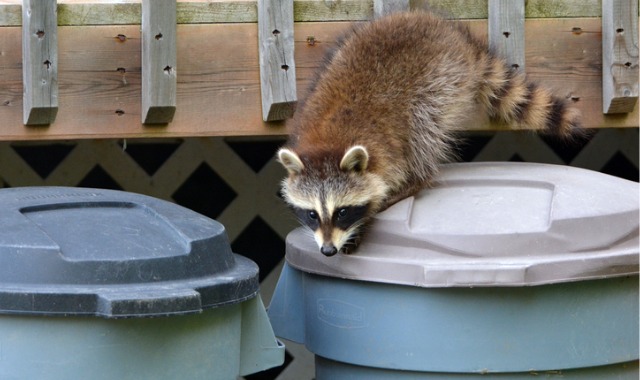By Dixie Somers
Raccoons aren't the cleanest of creatures, so there will usually be visible signs if you have one in your home. Omnivorous, dexterous and clever, these masked bandits can cause a lot of destruction in their search for food. They are also vectors for disease and pose an infectious risk to your family and pets. Raccoons are most likely to infiltrate your home in the winter to get out of the cold or springtime, when pregnant mothers seek secure dens for birthing cubs. If you live in an area with raccoons, here are four infestation signs to look out for.
Unexplained Noises
Raccoons are nocturnal, so you will probably hear them at night once the house quiets down for bedtime. They are also heftier than other household pests like rats and squirrels, so the noises they produce are extremely noticeable. In most cases, you will be able to hear raccoons in the attic or behind walls.
Evidence of Scat
Raccoons love to eat, and they must eliminate their waste eventually. You should be able to smell urine or scat once enough of it has accumulated behind your walls. Normally, a raccoon will pick out a favorite spot for going to the bathroom, which means there will be piles of old and new droppings in one place.
Visible Entry Points
With their razor-sharp teeth and dexterous paws, raccoons can easily tear through walls, wiring, support beams and other materials to gain access to your home. Some examples of common entry points include holes in the foundation, loose panels under the porch and loose shingles on the roof. An uncapped chimney is an especially tempting entrance for a raccoon, giving it direct access from the roof to the inside of your home. If you have an uncapped chimney, certified chimney sweeps can easily install a cap to prevent unwanted guests from living inside your chimney.
Garbage Cans Knocked Over
To a raccoon, garbage cans are practically an all-you-can-eat buffet. It's normal to see trash cans knocked over a few times a year if you live in an area with raccoons. However, if it occurs on a regular basis, it's a sure sign that raccoons are living extremely close by, such as your attic crawlspace.
Damages caused by raccoons can be expensive and potentially dangerous. To keep your home and family safe, secure your garbage cans and regularly inspect your home for vulnerable access points. If you notice any of the above signs of a resident raccoon, be sure to contact professionals for safe removal.
 Dixie Somers is a freelance writer who loves to write for business, health and women’s interests. She lives in Arizona with her husband and three beautiful daughters.
Dixie Somers is a freelance writer who loves to write for business, health and women’s interests. She lives in Arizona with her husband and three beautiful daughters.








